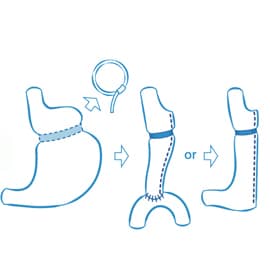
Are you a person who has had weight loss surgery in the past, perhaps a gastric band, but it hasn’t quite delivered the results you hoped for? Or are you experiencing uncomfortable side effects? At Sydney Bariatric Clinic, we understand that sometimes, the first surgery isn’t the final answer. We offer Revisional Bariatric Surgery to help you get back on track towards better health and a more comfortable life.
What is Revisional Bariatric Surgery?
Revisional bariatric surgery is a procedure performed when your initial weight loss surgery, like a gastric band, isn’t working as intended. This might mean you haven’t lost enough weight, you’ve regained weight, or you’re experiencing complications. Our single-stage revisional bariatric surgery often involves removing an old gastric band and, in the same operation, converting it to a different, more effective procedure like a gastric sleeve or gastric bypass.
Why Might You Need a Revision?
Many people seek revisional surgery for various reasons. You might consider it if:
Benefits of Single-Stage Revisional Surgery
Choosing a single-stage revision offers several advantages:
What to Expect: Recovery and Long-Term Outlook
Revisional surgery is typically performed using laparoscopic (keyhole) techniques. This means smaller incisions, which generally lead to less pain and a quicker recovery compared to traditional open surgery. Most patients stay in the hospital for about 2-3 days.
Your recovery will involve a careful diet progression, starting with liquids and gradually moving to softer foods and then solids over several weeks. It’s crucial to follow your surgeon’s and dietitian’s instructions carefully for the best results.
For long-term success, a commitment to a healthy lifestyle, including a balanced diet and regular physical activity, is key. You will also need to take lifelong vitamin and mineral supplements to prevent any nutritional deficiencies. Revisional surgery can be very effective in helping you achieve lasting weight loss and improve your overall health when combined with these lifestyle changes.